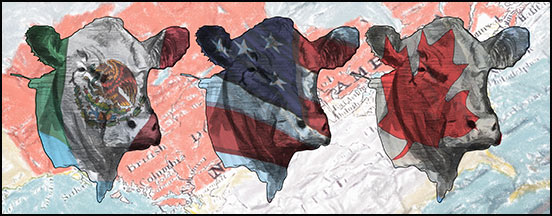
WTO Ruling on COOL
Sparks Varied Reactions
WTO ruled U.S. COOL does not comply with trade obligations;
retaliation possible.
The World Trade Organization’s (WTO) Appellate Body ruled against the United States’ country-of-origin labeling (COOL) requirements for meat May 18, upholding the compliance panel’s report in finding against the United States. The decision sparked varied reactions from different beef industry organizations.
House Agriculture Committee Chairman K. Michael Conaway (R-TX) stated, “Once again, the WTO has found COOL to be noncompliant — a decision we fully expected. As retaliation by Canada and Mexico becomes a reality, it is more important now than ever to act quickly to avoid a protracted trade war with our two largest trade partners. I have asked my colleagues on the Agriculture Committee to weigh in on resolving this issue once and for all during a business meeting this Wednesday in a targeted effort to remove ongoing uncertainty and to provide stability.”
The COOL Reform Coalition is calling for immediate congressional intervention to bring the United States into compliance with its trade obligations. The only way to mitigate the negative impact of the U.S. manufacturing and agricultural economies, and to save thousands of jobs, is for Congress to act now, said the coalition’s more than 100 associations and companies that represent U.S. food, agriculture and manufacturing industries.
“WTO-authorized retaliation by two of the largest U.S. trading partners could result in very substantial tariffs affecting multiple sectors of the U.S. economy, threatening the livelihoods of American families who depend on U.S. manufacturing,” said Linda Dempsey, vice president of international economic affairs at the National Association of Manufacturers, and co-chair of the COOL Reform Coalition.
Canada has already issued a preliminary retaliation list targeting a broad spectrum of commodities and manufactured products that would affect every state in the country. Mexico has not yet announced a preliminary retaliation list, but has implemented retaliatory tariffs in the past, which may be indicative of future tariff actions.
“More than 95% of the world’s consumers live outside of our borders. We flaunt our country’s obligations under the rules-based trading system at our peril,” said U.S. Chamber Senior Vice President for International Policy John Murphy and co-chair of the COOL Reform Coalition. “American farmers, workers and companies will not be able to sell their goods and services to those consumers if we fail to live up to these rules ourselves. Congress must take action now to repeal the COOL rule for meat before retaliation hits as soon as late summer.”
National Cattlemen’s Beef Association (NCBA) President and Chugwater, Wyo., cattleman Philip Ellis said, “We have long said that COOL is not just burdensome and costly to cattle producers, it is generally ignored by consumers and violates our international trade obligations.
“Now that the WTO has ruled for a fourth time that this rule discriminates against Canadian and Mexican livestock, the next step is retaliation by Canada and Mexico. Retaliation will irreparably harm our economy and our relationships with our top trading partners and send a signal to the world that the U.S. doesn’t play by the rules. It is long past time that Congress repeal this broken regulation.”
Others still hope for COOL
Conversely, a few agriculture groups maintained that COOL can still move forward.
The United States Cattlemen’s Association (USCA) Director Emeritus Leo McDonnell said, “The panel’s findings allow Canada and Mexico to now file notification of their intent to retaliate; any filing done on their part will specify the retaliation amounts they believe are warranted. The U.S. may request arbitration on any requested levels of retaliation; the process to conduct all necessary protocol will take approximately 60 days.”
“As stated by USCA previously, COOL provides consumers a choice at the grocery stores and the ability for U.S. cattle producers to differentiate their product. As other countries move to implement country-of-origin labeling programs, we are disappointed that today’s ruling by the WTO contradicts this growing trend.”
McDonnell continued, “This past week saw significant movement on Fast Track Authority, and inevitably the Trans-Pacific Partnership (TPP) agreement. TPP has the potential, if implemented, to increase and broaden the import and export markets for the U.S. With a burgeoning international trade arena, it is vital that today’s consumers know where their food products originate. We are asking that consumers have a choice; once the product reaches the store shelves, then it is up to them on where they will lend their buying power.
“USCA will work with the administration and Congress to implement any necessary changes to COOL as required by today’s ruling. We are committed to maintaining the information provided to consumers through the ‘A’ label, which distinguishes those products born, raised and harvested in the U.S., and will work to address any concerns or violations as ruled on by the WTO,” McDonnell added.
National Farmers Union (NFU) President Roger Johnson said while the Appellate Body of the WTO issued its decision May 18, there is still ample opportunity for the administration, Mexico and Canada to negotiate an acceptable path forward.
“As we have seen in other disputes, once decisions are handed down, WTO members often work together to find a solution that will work for them,” said Johnson. “In this case, such a solution must involve continuation of a meaningful country-of-origin labeling requirement.”
Johnson pointed out that there have been various press reports in recent weeks indicating that the administration will work with Canada and Mexico on COOL.
“We support that approach to the extent it results in a mutually agreed result that provides consumers meaningful information on the meat products they purchase, including the country where the animal was born, raised and slaughtered. With the significant interest by consumers in knowing where their food comes from, any other result is not acceptable,” Johnson said.
“While those who have opposed giving consumers more information on where their meat products are from have focused on potential retaliation, retaliation is relevant only if the parties cannot reach an agreement on how to move forward and then only after an arbitration process,” said Johnson. “And the amount of any retaliation is by definition speculative at best and aimed to raise alarm where none is warranted. Indeed, looking at the recent report from Dr. Robert Taylor at Auburn University, there is significant evidence indicating that any harm to our trading partners has in fact been negligible, at most.”
Johnson concluded, “Congress may well have a role to play once the administration has worked with our trading partners following today’s decision if a statutory modification is deemed warranted by the administration, but the time for action is not now,” said Johnson. “Those who find value in greater information to consumers on where their food products are from want to see the administration work with Canada and Mexico for a resolution that maximizes the information to consumers in all three countries, not see a retreat from information that helps consumers make informed purchasing decisions.”

Editor’s Note: This article is compiled from releases from the House Committee on Agriculture, the COOL Reform Coalition; NCBA; USCA; and NFU.





